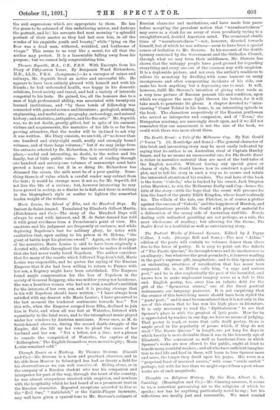Marie Louise, the Island of Elba, and the Hundred Days.
By Imbert de Saint-Amend. Translated by Elizabeth Gilbert Martin. (Hutchinson and Co.)—The story of the Hundred Days will always be read with interest, and M. de Saint-Amand has told it with great vividness from a Frenchman's point of view. His emotions and his judgment are frequently at variance, and while deploring Napoleon's lust for military glory, he notes with exultation that, upon sailing to his prison in St. Helena, " the giant of battle kept his glorious sword." Again, on the first page of the narrative, Marie Louise is said to have been originally a devoted wife, while throughout the narrative he makes it evident that she had never really loved Napoleon. The author considers that for many of the results which followed Napoleon's fall, Marie Louise was responsible, and he quotes the saying of the Russian Emperor that if she had been willing to return to France with her son, a Regency might have been established. The Empress found ample compensation for the loss of Napoleon in the society of General Neipperg, who was neither young nor handsome. She was a heartless woman who had not even a mother's ambition for the interests of her own son, and it is passing strange that in his will Napoleon should have written : " I have always been satisfied with my dearest wife Marie Louise ; I have preserved to the last moment the tenderest sentiments towards her." Yet this wife, when the Emperor escaped from Elba, declined to join him in Paris, and when all was lost at Waterloo, listened with equanimity to the fatal news, and to the triumphant music played under her windows by Austrian musicians. Never once, as M. de Saint-Amand observes, during the second death-struggle of the Empire, did she lift up her voice to plead the cause of her husband and her son. "Not a letter, not a line ; not a phrase to console the vanquished of Waterloo, the captive of the ' Bellerophon.' The English themselves were moved to pity; Marie Louise remained cold."


































 Previous page
Previous page